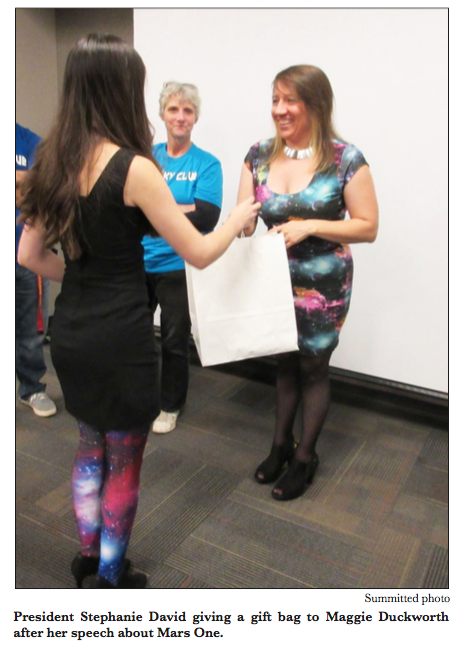Finalist Maggie Duckworth talks living on Mars and her biggest fears for our astronomical future
By: KATIE LEICHT
Art & Life Editor
Last month on Nov. 9, the Sky Club hosted an event on Mars One, a new and upcoming one way manned mission to Mars.
Maggie Duckworth, one out of 100 finalists accepted for the first ever manned mission to our sibling planet, came to Meramec to inform others more in depth into what Mars One really is. The main mission of Mars One is to establish permanent human settlement and sustain human life on the red planet.
The first initial step to further get Mars One in motion is to prove it is capable to make this trip successfully. Otherwise investors will not supply the funding for the trip said Duckworth. This funding is needed due to the fact that Mars Onehasanestimatedcostofaround $6 billion. In 2020, Mars One is going to send a demonstration lander to Mars, Duckworth said.
This will prove Mars One has the technology to get to Mars successfully. This is such an important part of the entire Mars One expedition because if we cannot be proven this trip can make it to Mars successfully, investors will not give the $6 billion needed to fund the trip, Duckworth said.
Before possibly sending Maggie and others to Mars, Mars One wants the best equipped people for the journey. This means scientist from Mars One will study each chosen candidate closely and pair them with three other chosen candidates. From here, the scientist will give the chosen four people activities to complete on Earth, and see how they problem solve together before deciding how well they work with one another, Duckworth said.
“It’s really good to have people that can work together, as opposed to getting five people who are really good at one thing and then throwing them into a room and letting them problem solve,” Duckworth said.
If this planning before take off did not occur, the team may run into some issues. If the team does not get along, the outcome may not be very good, especially in a life or death situation, Duckworth said.
“It would be like going on a seven-month road trip across the UnitedStatesinatinycarwiththree people you hate,” Duckworth said.
In 2022, Mars One will send a rover to Mars. This will help to find the ideal landing spot for Mars One to land and grow, Duckworth. When looking for an ideal place to live, maximizing sunlight and water accessibility is vital.
“One cool things about Mars is it has water. The water is at the poles. The other cool thing about Mars is it has pretty good access to sunlight. The best sunlight is at the equator,” Duckworth said.
The rover will be able to scope out the best place to expand the human population when they land. Dust storms on Mars will be able to knock out the power, due to the fact the sun will be covered from the storm, therefore not being able to supply the crew with energy to power anything, Duckworth said.
These dust storms can last up to years on Mars, so the rover will be the best bet to supplying the crew with the most ideal place to permanently live.
Mars One has already encountered a few small set backs. These set backs include irability to launch due to where Mars is located in the solar system at the moment of launch.
These set backs are usually about two years long due to the amount of time it takes Mars to orbit the sun compared to how long it takes Earth to orbit the Sun.
Since Mars has a slower revolution around the Sun than Earth, the right timing is needed until the planets are close enough to one another. This way, Mars One and the planet Mars itself, will meet at just the perfect timing, said Duckworth. 2026 is when Mars One should be initially launching.
The computer system that will be used to get the teams of four to Mars has to be preprogrammed on how to physically get to the planet safely, and how to anticipate problems along the way. This program is still in the works, but should be ready by the time it is needed in 2026.
“Another problem that we could have is, we don’t know what it will be like to live on an alien planet, and in a really extremely hostile environment for the rest of our lives,” Duckworth said.
Each individual chosen to transcend themselves about 140 million miles from Earth knows just how easily they could encounter death.
“It takes seven minutes for a message to get from one planet to the other,” Duckworth said.
This means, if there was a problem, there is nothing Earth citizens could really do about it.
Once Mars One sends the first group of four into space, the plan is to keep sending people for the indefinite future.
“We will keep growing this colony on Mars until we have people living and working and having productive lives on another planet,” Duckworth said.
Duckworth is excited to embark on this journey with no return, she said.
“It is exciting to land on Mars because we will be the first people ever to land on Mars, to land on another planet, ever,” Duckworth said.
Besides the fear of death, her main fear is philosophical, Duckworth said.
“Besides dying, my worst fear is failing. It’s that no one ever makes it to Mars, or any planet for that matter,” Duckworth said.











